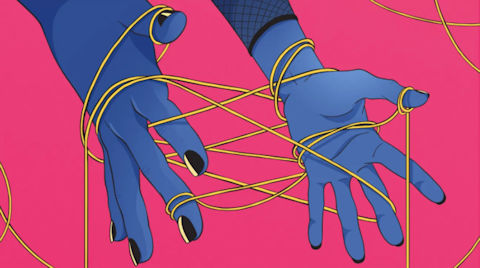Source: Greatist.com.
USA – It’s safe to say BDSM has entered the mainstream. But while the “Fifty Shades” craze revealed the not-terribly-surprising fact that a lot of folks (read: your mom and most of her friends) have a sexually deviant streak, the book and movie did not do a great job at educating the world about how to (safely) practice BDSM.
There’s still quite a bit of problematic misconceptions — especially regarding consent — to the wade through to get to the heart of what BDSM is all about.
But, as we all know, when battling stigma and personal bias, wading through misconceptions to find the truth is worth it. At the other end lies the potential for improved self-confidence, deeper self-knowledge, and intimacy on another level.
“Through kink I learned to own my power and found my voice. This helped me build my self-esteem and confidence in the boardroom and the bedroom,” Kenneth Play, 39, co-founder of International Sex Hacker and Educator, & Co-Founder of Hacienda Villa, an intentional sex-positive community.
You may want to jump right in, but, for the safety of everyone involved, it’s important to get some basics down first. Below we go over important rules, tips for getting started, and how to bring it up with a partner.
What is BDSM?
BDSM stands for bondage/discipline, submission/dominance, and sadism/masochism. These categories refer to a wide array of kinks and erotic practices.
Practicing BDSM is about a lot more than the act of having sex. In fact, “a scene” may not involve sex or, even touching, at all. You’ll find that many of the common themes — power dynamics, pain, humiliation, the taboo — are psychological in nature.
If you’re thinking that sounds intense, don’t worry! It’s completely up to you how deep you want to get and how far you want to go with something. In BDSM, enthusiastic consent is paramount: you and only you decide how you want things to go.
BDSM, defined
This is a very basic description of what the BDSM subcategories mean. And remember, every aspect of these types of play is consensual and talked about beforehand.
- Bondage/discipline. Bondage refers to someone being physically restrained. Discipline refers to a set of rules and punishment, usually enforced by the dominant partner onto the submissive.
- Submission/dominance. Sub/dom play is when one person, the sub (or bottom) permits the dom (or top) to essentially be in charge. This may be an agreement you make for one night of play or it may be a 24/7 arrangement.
- Sadism/masochism. Sadism is the enjoyment of doling out pain. Masochism is the enjoyment of receiving pain. If you like both? Well, that’s what we call a sadomasochist.
The BDSM dictionary
With all distinctive cultures come an expansive vocabulary! This is by no means an exhaustive list but it’ll give you a start.
| Aftercare | a post-scene ritual intended to help the dominant and submissive wind down and check in |
|---|---|
| Breath control play | restriction of oxygen to increase pleasure (i.e. choking, asphyxiation) |
| Chastity | denial of a partner to have sex and/or masturbate — sometimes devices are used to ensure chastity (cock cages or chastity belts) |
| Collared/collaring | worn to indicate someone’s status as a submissive (collaring can indicate belonging to a dominant, and to some is seen as the ultimate level of commitment) |
| Cuckold | a man/masc person who enjoys watching their femme partner have sex with someone in front of them |
| Dom/domme/dominant | the partner who leads the power dynamic in a dominant/submissive scene |
| Edgeplay | bringing a partner to the brink of orgasm, but not letting them orgasm |
| Fetish | intense sexualization of an act, object or scenario |
| Golden showers | the act of a partner urinating on another |
| Hard limits | limits that never will be negotiable |
| Leather | a subset of BDSM culture dictated by leather-wearing practices |
| Pegging | refers to a woman/femme identifying person having anal sex with a man/masc identifying person, typically with a strap-on |
| Playspace | an area designated for a scene or BDSM play |
| Risk aware consensual kink | an alternative to SSC (below), as the term is disliked in the community for it’s ableist language (RACK also argues that kink isn’t ever safe, but that those that participate acknowledge the risks) |
| Safe, sane, consensual (SSC) | a BDSM philosophy dictating the pillars of BDSM play |
| Safeword | a word or physical cue meant to end play |
| Subspace | a mental space submissive’s can go through in the middle of a scene; it’s often considered “dreamy” or “floaty” like a high |
| Switch | a partner who can be dominant or submissive |
| Topping from the bottom | a bottom/submissive telling their top/dominant what to do to them |
| Vanilla | non-kink/BDSM activity |


